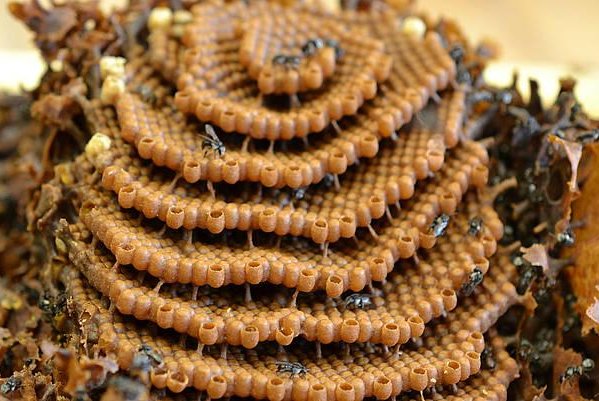New research showed the Australian stingless bee benefited from plant biodiversity. Photo by Sara Leonhardt/University of Würzburg
Aug. 22 (UPI) -- New research suggests bees can maintain healthy colonies in agricultural regions if provided habitat islands with sufficient plant biodiversity.
Many studies have detailed the threats -- pesticide use, habitat loss and monoculture farming -- facing honey bees, pollinators essential to global food systems. But new research suggests plant biodiversity can at least partially mitigate these threats.
In a new study, published recently in the journal Scientific Reports, scientists tracked the health of Australian stingless bee colonies in a variety of habitats.
"We chose natural forests, urban gardens and macadamia plantations with intensive agricultural use and observed the growth and the production of worker bees, queens and new colonies," Benjamin Kaluza, researcher at the University of Würzburg in Germany, said in a news release.
Researchers measured the nutritional quality of the pollen and honey from each of the monitored colonies. Not surprisingly, the health of the bees and their colonies -- as revealed by pollen and honey quality -- were greatest in gardens and biodiverse forests.
Colonies situated on plantations and monoculture farmland were the least healthy. Scientists identified a strong correlation between plant biodiversity and bee health.
"Bees need diversity," said Kaluza. "Only in environments rich in plant species do they find continuously sufficient, balanced and high-quality food and other resources."
Previous research has shown bees are most at risk when facing a combination of threats. Often, a lack of proper nutrition, accentuates the deadly effects of pesticides and disease. Monoculture farming has previously been linked with insufficient bee nutrition.
The latest findings suggest greater levels of plant biodiversity can boost bee health.
"It allows them to compensate the negative influence of both pesticides and monocultures," said researcher Sara Leonhardt. "This result means that the worldwide massive decline of biodiversity could be one of the main causes of bee extinction."















